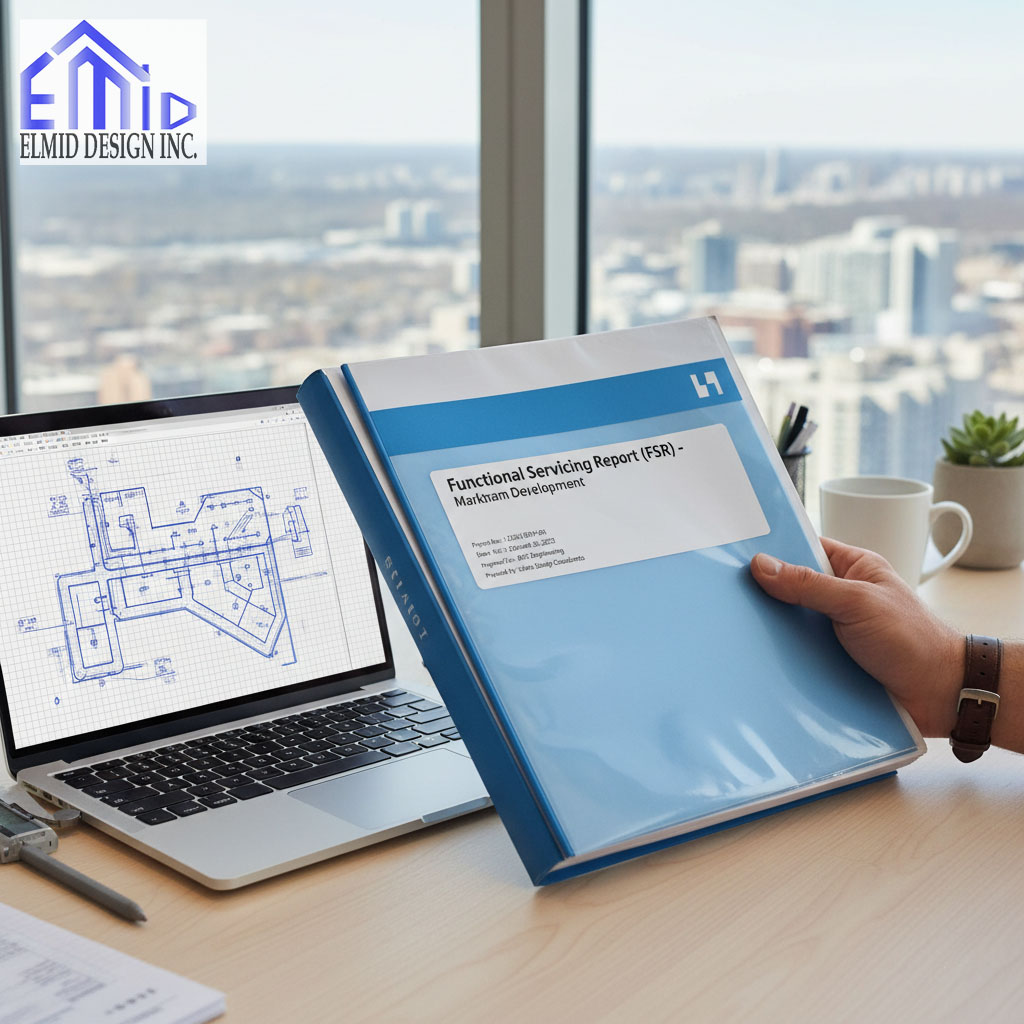A functional servicing report Markham provides proof that a proposed building can connect to municipal services such as water supply, sanitary sewers, and stormwater management systems. Developers must submit this report to secure rezoning, subdivision, or site plan approval. Without it, projects cannot move forward. In Markham, rapid growth places pressure on infrastructure, so the city requires detailed servicing analysis before approving new buildings. By preparing a functional servicing report, developers show that their projects meet city standards and can be supported by existing or upgraded municipal systems.
Why Markham Requires a Functional Servicing Report for Buildings
The City of Markham has grown rapidly, with new subdivisions, towers, and commercial projects transforming the landscape. To ensure this growth does not overwhelm existing infrastructure, every significant building project requires a functional servicing report. This report proves that the development will not place excessive demand on water mains, sanitary sewers, or stormwater systems. By requiring these studies, the city ensures new construction is safe, sustainable, and aligned with long-term infrastructure planning.
The Connection Between Functional Servicing Reports and Building Approvals
Building projects in Markham cannot proceed without technical proof that servicing is available. The functional servicing report provides this assurance. Municipal staff use the report to determine whether water, sanitary, and stormwater networks can accommodate the proposed development. If the report shows deficiencies, approval will be delayed until solutions are provided. For developers, the report is not simply paperwork but a gateway to site plan and rezoning approvals. Without it, no building permit can be issued.
Key Components of a Functional Servicing Report in Markham
A functional servicing report prepared for a building in Markham follows a structured format. It begins with a project overview, describing the property and proposed construction. It then reviews existing municipal infrastructure around the site. The report includes water demand projections, fire flow analysis, and sanitary flow calculations. It evaluates the stormwater system and presents strategies to manage both quality and quantity of runoff. Grading and drainage plans are also included. These components work together to show that the building can be safely serviced.
Markham’s Engineering Standards for Functional Servicing Reports
Markham enforces its own engineering design criteria that define how engineers must prepare functional servicing reports. These criteria cover water supply systems, sanitary sewers, stormwater management, and grading requirements. Developers must follow the formulas, assumptions, and guidelines established by the city. Provincial and regional standards also apply, especially when York Region or conservation authorities become involved. City staff return any report that fails to follow these standards and require the developer to revise it. Builders should therefore rely on engineers with strong knowledge of Markham’s specific requirements.
Water Servicing Considerations for Markham Buildings
Water servicing is one of the most critical elements of a functional servicing report in Markham. The report estimates domestic demand based on proposed units or occupancy. It also confirms that the building design meets fire flow requirements under maximum demand conditions. Engineers compare calculations directly with available watermain capacity to verify adequacy. If the infrastructure lacks capacity, the report recommends upgrades or new connections. City staff grant approval only when developers demonstrate that both daily water needs and emergency fire protection are satisfied. This makes water servicing analysis central to every report.
Sanitary Servicing and Wastewater Capacity in Markham
Buildings in Markham generate wastewater that must be directed into the sanitary sewer system. The functional servicing report estimates peak sanitary flows using design factors required by the city. It also evaluates the capacity of the downstream system. If sanitary sewers are undersized or already near capacity, the report must identify potential solutions. These may include upgrading pipes, rerouting flows, or temporary on-site storage. Wastewater analysis is often one of the most challenging sections of the report due to existing system constraints.
Stormwater Management in Markham Building Developments
Stormwater management is a mandatory component of every functional servicing report in Markham. New buildings create impervious areas that increase runoff. The report explains how the developer will control stormwater so post-development flows stay within pre-development limits. It also shows how the developer will protect water quality through on-site storage or filtration. Markham enforces strict stormwater guidelines to safeguard waterways and reduce flooding risks. Developers must submit clear stormwater strategies to secure approvals and demonstrate long-term environmental responsibility.
Grading and Drainage in Functional Servicing Reports
Functional servicing reports in Markham include grading and drainage sections to ensure safe and effective surface water management. The report outlines grading plans that direct water away from buildings and toward approved outlets. It also identifies overland flow routes to manage major storms. In Markham, city staff review grading closely to confirm that new developments avoid flooding or drainage issues on neighboring properties. Proper grading plans not only secure approvals but also safeguard long-term building performance and protect resident safety.
The Role of Professional Engineers in Markham Functional Servicing Reports
Functional servicing reports must be prepared and stamped by professional engineers licensed in Ontario. This ensures accountability, technical accuracy, and compliance with municipal standards. Firms such as Elmid Design Inc, which hold a certificate of authorization from Professional Engineers Ontario, specialize in preparing these reports. Their expertise ensures that water, sanitary, stormwater, and grading analysis meet all requirements. Developers benefit from working with licensed engineers, as approval depends directly on the technical quality of the report.
How Functional Servicing Reports Contribute to Sustainable Building in Markham
Sustainability is an important consideration in Markham’s building sector. Functional servicing reports play a role by ensuring water use, wastewater generation, and stormwater runoff are managed responsibly. By requiring developers to control flow and protect water quality, the city promotes long-term environmental resilience. Sustainable servicing strategies also reduce risks such as flooding and infrastructure overload. For developers, this focus creates buildings that are not only approved for construction but also better positioned for long-term value and durability.

The Submission and Review Process for Functional Servicing Reports in Markham
When a developer submits a functional servicing report in Markham, it becomes part of the rezoning, subdivision, or site plan application. Municipal engineers review the document against city standards and provincial guidelines. Each section is analyzed to confirm that proposed water, sanitary, and stormwater systems are adequate. If inconsistencies or gaps are identified, comments are issued, and revisions are required. This process may take several rounds depending on the complexity of the project. A clear, well-prepared report reduces the time spent in review and accelerates approval.
Common Challenges in Markham Functional Servicing Reports
Functional servicing reports for Markham building projects often face predictable challenges. One frequent issue involves underestimating water or sanitary demands, particularly for high-density residential towers. Stormwater management presents another difficulty, as many urban sites lack the space needed for effective detention systems. Aligning servicing strategies with ongoing design changes can also cause delays. These challenges highlight the need for strong coordination between developers, engineers, and municipal staff. By anticipating potential issues, developers can prevent costly revisions and project delays.
Cost Factors in Preparing a Functional Servicing Report in Markham
The cost of preparing a functional servicing report in Markham varies based on project type and size. A small infill development may only require straightforward servicing analysis, while larger mixed-use or multi-phase projects demand detailed modeling and extended coordination. Costs increase when infrastructure upgrades or external servicing improvements are identified. Although developers may view the report as an expense, it is a required investment for building approval. Engaging experienced engineers helps ensure that the cost results in a report that secures approval efficiently.
Timelines for Functional Servicing Report Preparation and Approval
Developers planning building projects in Markham must account for the time required to prepare and review a functional servicing report. Preparation typically takes several weeks, depending on the complexity of the site and the availability of background data. Once submitted, municipal review can extend over several months, particularly if revisions are requested. Coordination with regional authorities such as York Region or the Toronto and Region Conservation Authority can add further time. Developers who involve engineers early and plan carefully avoid unnecessary schedule impacts.
Case Studies of Functional Servicing Reports in Markham Building Projects
Real-world projects in Markham highlight the critical role of functional servicing reports. Developments along Yonge Street required detailed water and sanitary analysis to confirm that existing networks could support high-rise construction. In another case, a residential development required advanced stormwater management strategies to mitigate runoff into sensitive waterways. These reports not only provided solutions but also gave city staff the confidence to grant approvals. Case studies demonstrate how well-prepared reports can resolve complex challenges and move projects forward efficiently.
The Importance of Regional and Conservation Authority Coordination
Functional servicing reports in Markham often extend beyond city boundaries. York Region manages major water and wastewater infrastructure, while the Toronto and Region Conservation Authority oversees watershed management and stormwater impacts. Many developments in Markham must meet the requirements of these agencies in addition to local standards. Early coordination is critical to avoid delays during the review process. A functional servicing report that addresses both municipal and regional requirements provides a more complete servicing strategy and a smoother path to approval.
Integration of Hydrogeological Studies in Markham Building Projects
Some building projects in Markham involve deep excavations for parking structures or basements. These projects often require hydrogeological studies to assess groundwater conditions. A functional servicing report may incorporate these studies to determine whether excavation could impact surrounding infrastructure or require dewatering. Including hydrogeological data helps city engineers evaluate long-term impacts on municipal services and nearby properties. By combining hydrogeological analysis with servicing strategies, developers provide a complete servicing plan. This integration reduces risks and ensures compliance with both municipal and regional requirements.
Risk Management through Functional Servicing Reports
Functional servicing reports act as a vital tool for risk management in Markham developments. They identify infrastructure constraints and servicing conflicts before construction begins. For example, if a downstream sewer is already at capacity, the report highlights the issue so upgrades can be planned early. Stormwater solutions included in the report reduce flooding risks and protect properties. By addressing these risks during the planning stage, developers reduce the chances of costly delays during construction. Functional servicing reports therefore provide long-term financial and operational protection.
Functional Servicing Reports and Sustainable Building in Markham
Sustainability is a growing priority in Markham, and functional servicing reports contribute to this goal. Reports require developers to manage water use, wastewater generation, and stormwater runoff responsibly. This ensures new buildings do not overwhelm local infrastructure or harm the environment. By embedding sustainability in servicing strategies, reports support resilient urban growth. For developers, sustainable servicing also improves building performance, reduces maintenance issues, and increases long-term property value. The city benefits as well, with infrastructure that remains reliable even under growing demand.
Best Practices for Developers Preparing Functional Servicing Reports
Developers in Markham can achieve faster approvals by following best practices during the preparation of functional servicing reports. Engaging licensed engineers early ensures servicing strategies align with building designs. Gathering accurate site data prevents delays caused by incomplete information. Maintaining open communication with municipal staff allows issues to be resolved before submission. Working with experienced engineering firms such as Elmid Design Inc, which holds a certificate of authorization from Professional Engineers Ontario, provides additional credibility. These practices increase efficiency and improve project outcomes.
Collaboration Between Developers and City Staff in Markham
A functional servicing report is more than a technical document; it is also a communication tool between developers and city staff. Collaboration ensures that the report addresses both engineering and planning requirements. Early discussions with municipal engineers allow potential issues to be identified before submission. Developers who maintain consistent communication throughout the review process often experience fewer revisions. This collaboration builds trust with the city and demonstrates a commitment to compliance. In Markham, strong partnerships between developers and staff lead to more efficient approvals.
The Impact of Functional Servicing Reports on Construction Planning
Functional servicing reports influence construction planning long before work begins on-site. The report identifies infrastructure upgrades, new connections, or off-site works that must be coordinated with construction schedules. These requirements affect staging, budgeting, and sequencing of building activities. By aligning servicing recommendations with construction planning, developers reduce risks of delays once construction is underway. In Markham, where multiple authorities may be involved, integrating servicing outcomes into construction schedules ensures smoother execution and more predictable timelines.
Regional Infrastructure Considerations in Markham Building Projects
Markham developments often rely on infrastructure managed by York Region, including major water and wastewater systems. A functional servicing report must therefore address both local and regional servicing conditions. Coordination with York Region ensures that proposed developments align with regional capacity and long-term infrastructure plans. This integration is critical for larger projects where regional systems may already face demand pressures. Developers who account for regional infrastructure early in their reports achieve approvals that reflect both municipal and regional priorities, reducing future conflicts.
Conservation Authority Requirements for Stormwater in Markham
Many building sites in Markham fall under the jurisdiction of the Toronto and Region Conservation Authority. In these cases, functional servicing reports must meet both city and conservation authority standards for stormwater. Requirements often include advanced stormwater management practices to protect sensitive watersheds and minimize erosion. By addressing these additional standards in the report, developers provide a complete strategy that satisfies all governing bodies. Meeting conservation authority requirements also demonstrates environmental responsibility, which supports long-term resilience and sustainability.
How Functional Servicing Reports Strengthen Long-Term Property Value
A functional servicing report is not only a requirement for building approval but also a safeguard for property value. Reliable water, sanitary, and stormwater systems ensure that buildings remain functional and resilient over time. Proper servicing reduces risks of flooding, backups, and costly infrastructure failures. In Markham’s competitive real estate market, well-serviced properties offer stronger long-term value for owners and occupants. By investing in high-quality servicing reports, developers secure both approvals and the future reliability of their projects.
Why Developers Should Engage Engineers Early in Markham Projects
The most successful building projects in Markham begin with early engagement of professional engineers. Starting the functional servicing process during the initial design phase ensures that servicing strategies align with site layouts and architectural plans. Early involvement also allows engineers to identify potential capacity constraints and coordinate with municipal or regional staff before submission. Developers who delay engineering input often face revisions that slow down approvals. Engaging engineers such as Elmid Design Inc early creates efficiency and builds confidence in project outcomes.
Future Trends for Functional Servicing Reports in Markham
As Markham continues to grow, functional servicing reports will evolve to meet new challenges. Increasing density will require advanced stormwater solutions, innovative water conservation strategies, and integration of green infrastructure. Climate resilience will also shape future requirements, as the city seeks to manage extreme weather events more effectively. Developers can expect reports to become more detailed and multidisciplinary. Staying ahead of these trends will help builders adapt quickly and maintain compliance. Functional servicing reports will remain essential to sustainable and resilient growth in Markham.
Frequently Asked Questions About Functional Servicing Report Markham
What is a functional servicing report in Markham?
A functional servicing report in Markham is an engineering study that demonstrates how a proposed building can connect to municipal water, sanitary, and stormwater systems while meeting city standards.
Who prepares a functional servicing report in Markham?
Only licensed professional engineers in Ontario can prepare and stamp functional servicing reports. Firms like Elmid Design Inc are qualified to complete these reports.
Why is stormwater management important in Markham functional servicing reports?
Stormwater management is required to control runoff and protect water quality. The report must show how post-development flows will not exceed pre-development conditions and how pollutants will be removed.
How long does it take to prepare and approve a functional servicing report in Markham?
Preparation typically takes a few weeks, while municipal review can last several months depending on project complexity and revisions requested by the city.
Can a building project proceed without a functional servicing report in Markham?
No, a functional servicing report is mandatory for most developments in Markham. Without an approved report, rezoning, subdivision, and site plan applications cannot proceed.

Elmid Design Inc: Engineering Excellence for Markham Developments
Elmid Design Inc is a professional engineering firm with a certificate of authorization from Professional Engineers Ontario. The company specializes in functional servicing reports, stormwater management, and grading designs for building projects in Markham. With proven expertise in municipal standards and regional requirements, Elmid Design Inc helps developers secure approvals efficiently while ensuring compliance. Their focus on accuracy, sustainability, and risk management makes them a trusted partner for builders seeking reliable engineering solutions that support successful and resilient developments in Markham.
Geographic Locations That We Service:
Our Licensed Professional Engineers specializing in Engineered Site Grading Plans offer the best-engineered site grading plan, lot grading and erosion plan, and drainage plan to obtain site plan approval and building permits in Ontario, including a wide range of municipalities. Each area boasts unique features and requirements, making our tailored approach essential for success.
Toronto and Surrounding Areas
In the vibrant heart of Ontario, we service Toronto (City of Toronto) and surrounding areas. Additionally, we cover Oshawa (City of Oshawa), Pickering (City of Pickering), and Clarington (Municipality of Clarington). Furthermore, our expertise extends to Ajax (Town of Ajax), Whitby (Town of Whitby), Brock (Township of Brock), Scugog (Township of Scugog), and Uxbridge (Township of Uxbridge).
Halton Region
Moving to the Halton Region, our services encompass Burlington (City of Burlington) and Halton Hills (Town of Halton Hills). Also included are Milton (Town of Milton) and Oakville (Town of Oakville).
Peel Region
In the Peel Region, we provide services in Brampton (City of Brampton), Mississauga (City of Mississauga), and Caledon (Town of Caledon).
York Region
Our services in the York Region cover Vaughan (City of Vaughan), Aurora (Town of Aurora), and East Gwillimbury (Town of East Gwillimbury). We also cater to Georgina (Town of Georgina), Markham (City of Markham), Newmarket (Town of Newmarket), Richmond Hill (City of Richmond Hill), Whitchurch-Stouffville (Town of Whitchurch-Stouffville), King (Township of King), and Bradford-West Gwillimbury (Town of Bradford-West Gwillimbury). Each municipality here offers a distinct setting, requiring our specialized approach.
Other Southern Ontario Cities and Towns
We also serve many other cities and towns in Southern Ontario. These include Hamilton (City of Hamilton), St. Catharines (City of St. Catharines), Niagara on the Lake (Town of Niagara on the Lake), Brant (County of Brant), Cambridge (City of Cambridge), Kitchener (City of Kitchener), Waterloo (City of Waterloo), and Woodstock (City of Woodstock). Furthermore, we operate in Guelph (City of Guelph), Centre Wellington (Township of Centre Wellington), Shelburne (Town of Shelburne), Orangeville (Town of Orangeville), New Tecumseth (Town of New Tecumseth), Essa (Town of Essa), Collingwood (Town of Collingwood), Wasaga Beach (Town of Wasaga Beach), Barrie (City of Barrie), Midland (Town of Midland), Orillia (City of Orillia), Ramara (Town of Ramara), Minden Hills (Town of Minden Hills), North Kawartha (Town of North Kawartha), Kawartha Lakes (City of Kawartha Lakes), Peterborough (City of Peterborough), Selwyn (Town of Selwyn), and Brighton (Municipality of Brighton).




